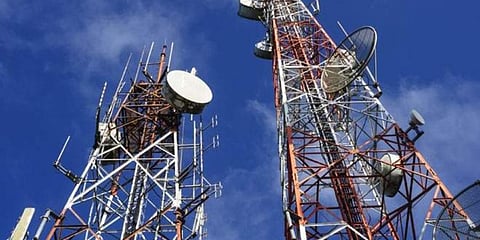

NEW DELHI: The Supreme Court on Tuesday granted time to the Department of Telecom (DOT) till November 17, to consider withdrawing legal cases against telcos, involved in the dispute of about Rs 40,000 crore.
A bench of Justices MR Shah and AS Bopanna listed the matter on November 17 after Solicitor General Tushar Mehta said that an affidavit has been filed by the government in which they have said that it is considering withdrawing the cases looking at the financial implication on the stressed telecom sector.
He sought three weeks' time to file the reply on the issue and enable the government to take a decision in this regard.
The bench noted that the Union of India had filed an affidavit on October 4 seeking three weeks' time.
In the affidavit, it is stated that the amount involved, which is the subject matter of adjudication, would be the imposition of financial liability on various Telecom Service Providers to the tune of Rs. 40,000 crores (approx.). It is further stated in the affidavit that in view of the subsequent developments, the Central Government is reviewing and/or reconsidering the decision to proceed with the present proceedings of appeal, it said.
The bench said that without expressing anything on such proposed action/decision, which might have a larger implication, it is adjourning the matter to November 17.
The Centre filed the affidavit in the appeal against Reliance Communications in which it has challenged the February 4 order of Telecom Dispute Settlement and Appellate Tribunal (TDSAT) by which it has quashed a government decision to charge for additional spectrum allocated to RCom.
The Tribunal had asked the telecom Department to return Rs 2,000 crore to the company.
The Union cabinet in 2012 had decided that operators should pay for holding spectrum above 6.2 MHz retrospectively, from July 2008 to January 1, 2013.
For spectrum above 4.4MHz, they would have to pay for the remaining period of their licenses starting January 1, 2013.
The Centre in its affidavit said that the amount involved, which is the subject matter of adjudication, would be the imposition of financial liability on various Telecom Service Providers (TSP) to the tune of Rs 40,000 approximately.
It is required to be pointed out that the Telecom Sector is passing through financial stress due to various circumstances.
It is respectfully submitted that despite certain measures taken by the government in the public interest, most of the TSPs providing for mobile phones and broadband have been making losses, it said.
The government further said that the Indian Bank Association has also conveyed to the Central government in writing that adverse developments in the telecommunication sector may lead to failures, vanishing competition, duopoly, unsustainable operation, and severe loss for the banking system which has huge exposure to this sector.
"The central government is desirous of reviewing and/or reconsidering its decision to proceed with the present proceedings of appeal. It is submitted that considering the nature of the issue involved, this decision will have to be taken after scrutiny at various levels which may consume some reasonable time," the affidavit said.
DoT has asked the Supreme Court for three weeks' time to enable "the central government to take an informed decision whether to proceed with the present appeal or not" and requested that the case be adjourned for a period of four weeks.
The government on September 15 had announced relief for telecom operators by giving them more time to pay dues and interest on penalties in the form of equities.
DoT said the decision was taken to promote the public interest, protect government revenue, and more particularly encourage competition amongst telecom operators by preventing a situation where the viability of some of the service providers becomes unsustainable resulting in monopolistic situations and other adverse impacts on the economy.